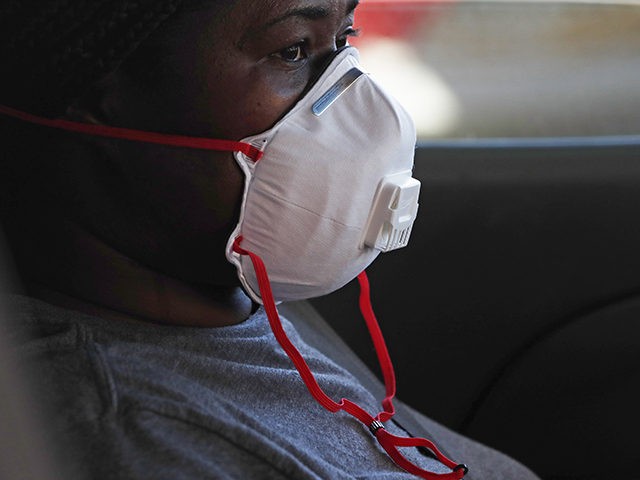Africans living in China continued reporting incidents of discrimination this week and worried they are being scapegoated by Chinese Communist Party (CCP) officials for a resurgence of coronavirus infections.
The CCP claims it has nearly eradicated the Wuhan virus across China, so new infections are blamed on foreigners and Chinese who have traveled abroad recently.
Voice of America News (VOA) on Thursday found Africans hiding in their homes, or forced to remain there by Chinese officials, even those that have not traveled abroad since the pandemic began. Other Africans have been evicted from their homes and turned away from hotels. They no longer gather in the streets of cities like Guangzhou, but some are forced to live on the streets.
“We as Africans wake every morning, and there are people standing at your door, they say you have to undergo this test. So it was a confusing situation because some of us were thinking that ‘Oh, now they want to put the virus in us, not just checking us,’” a Burundi businessman who has lived in China for 12 years told VOA.
“We have pictures showing how some people were locked down in their apartments without food. You can’t go out on the street if you are black,” said a spokeswoman for an association of Nigerians living in China.
One Kenyan woman reported that a roommate was taken away by Chinese authorities after a coronavirus test and has not been seen again.
The Epoch Times found a 19-year-old student from the Ivory Coast taking shelter under a bridge in Guangzhou, frantically calling everyone he knew in China so he could avoid sleeping on the streets. After numerous hotels refused him service, he finally found one that would take him. An anonymous local real estate agent confirmed “no one will accept” black renters at the moment.
The city’s African community feels it has been targeted for excessive testing, repeated quarantines, and other intimidating tactics.
“If they do this to all foreigners, then it’s not a problem, but it’s only black people,” said a Nigerian immigrant who claims to have been quarantined twice because the authorities refused to believe him when he said he had already been quarantined once.
A Nigerian computer student told the BBC he was thrown onto the street right after paying fees for the new semester at Guangdong University.
“Look how they are treating us, how they forced us out of our houses and forced us to self-quarantine. They told me that the [test] result is out and I am negative. Still they don’t want me to go out,” he said from a hotel where he finally found refuge.
Other African immigrants expressly told the BBC they are being blamed for a surge in coronavirus cases that is actually driven by Chinese nationals. One community leader who spoke on the condition of anonymity estimated that “98 percent of Africans are in quarantine.”
African leaders are increasingly angry over the treatment their countrymen are receiving in China, even those who would normally be reluctant to jeopardize money from China’s Belt and Road infrastructure plan by criticizing Beijing.
Politico on Thursday speculated the coronavirus backlash could “unwind the ties Beijing has carefully cultivated over decades” in Africa. The unraveling arguably began with popular resentment in Africa against arrogant and abusive Chinese companies moving in to handle the most important work on Belt and Road projects, depriving African workers of the best jobs.
The article noted that last week’s open letter of complaint from several African ambassadors to the Chinese Foreign Ministry “broke a long-standing tradition of Africa voicing its problems with China behind closed doors.”
The CCP’s initial response to that letter was unusually tart given the amount of effort it previously invested in wooing African allies, although later statements from the Foreign Ministry were more solicitous of what it described as “the African side’s reasonable concerns and legitimate appeals.”
Most observers seem convinced that Beijing can throw enough money at the African political elite to smooth out relations, although there are some signs the public is so angry about reports of discrimination from China that the elites feel obligated to confront their Chinese partners in terms more heated than the CCP was expecting, while populist opposition leaders in Africa sense an opportunity to attract support by criticizing the Chinese.
Ugandan politician and musician Bobi Wine, for example, announced on Monday he has launched an operation to airlift Africans “subjected to inhumane treatment” out of China. Wine said he would also help African-Americans mistreated by the Chinese escape to the United States.
The Wall Street Journal on Friday saw an unpleasant financial conflict brewing in Africa due to the immense economic damage inflicted by the coronavirus on African nations, their Chinese creditors, and Western institutions that have loaned billions of dollars to Africa.
In short, the Chinese are in no position to forgive African debt payments, and they are so desperate for capital that they’re thinking about activating provisions in some of those loans that would allow Beijing to grab strategic national assets from African nations.
Meanwhile, Africa’s other creditors are unwilling to offer debt relief because they know China would take advantage of any such generosity to grab more money and assets from Africa, which could be facing a 20 percent loss of Gross Domestic Product that would leave many governments unable to make payments on either their Chinese or Western loans.

COMMENTS
Please let us know if you're having issues with commenting.